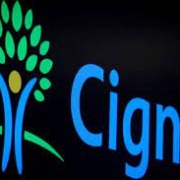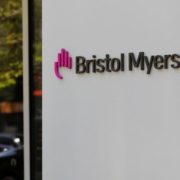Amgen 2022: Operation growth strategy
Amgen is equipped with a broad and diverse product portfolio, commercial capabilities, and levers for delivering mid-single digit revenue growth over this decade.
By Andrew Humphreys • [email protected]
One Amgen Center Drive
Thousand Oaks, CA 91320-1799
805-447-1000 • amgen.com
| Financial Performance | ||||
| 2021 | 2020 | 1H 2022 | 1H 2021 | |
| Revenue | $25,979 | $25,424 | $12,832 | $12,427 |
| Net income | $5,893 | $7,264 | $2,793 | $2,110 |
| Diluted EPS | $10.28 | $12.31 | $5.13 | $3.65 |
| R&D expense | $4,819 | $4,207 | $1,998 | $2,049 |
| All figures are in millions of dollars, except EPS. | ||||
Best-selling products
All sales are in millions of dollars.
2021 sales
- Enbrel $4,465
- Prolia $3,248
- Otezla $2,249
- Xgeva $2,018
- Neulasta $1,734
- Aranesp $1,480
- Mvasi $1,166
- Repatha $1,117
- Kyprolis $1,108
- Nplate $1,027
- Vectibix $873
- Kanjinti $572
- Evenity $530
- Epogen $521
1H 2022 sales
- Enbrel $1,913
- Prolia $1,774
- Otezla $1,045
- Xgeva $1,035
- Aranesp $715
- Neulasta $658
- Repatha $654
- Kyprolis $604
- Nplate $550
- Mvasi $487
- Vectibix $408
- Evenity $361
- Blincyto $277
- Epogen $256
Outcomes Creativity Index Score: 11
- Manny Awards — 7
- Cannes Lions — N/A
- Clio Health — N/A
- Creative Floor Awards — 4
- London International Awards – N/A
- MM+M Awards — N/A
- One Show — N/A
Amgen concentrates on areas of high unmet medical need and leverages the company’s expertise to strive for solutions that improve health outcomes and dramatically improve people’s lives. A biotechnology pioneer since 1980, Amgen has grown to become one of the world’s leading independent biotech companies, has reached millions of patients globally, and is developing a pipeline of medicines with breakaway potential.
Amgen is one of the 30 companies that comprise the Dow Jones Industrial Average and is additionally part of the Nasdaq-100 index. During 2021, Amgen was named one of the 25 World’s Best Workplaces by Fortune and Great Place to Work and one of the 100 most sustainable companies worldwide by Barron’s.
Amgen has outlined a growth strategy through 2030, a period during which management anticipates the company “will deliver attractive financial performance by serving many more patients globally than it does today, both with its current portfolio of marketed medicines and with the numerous new medicines it is advancing through its pipeline.”
During Amgen’s virtual business review meeting in February 2022, Chairman and CEO Robert A. Bradway stated that the company’s strategy remains concentrated on delivering innovative medicines that make a significant difference for patients around the world suffering from serious diseases – whether those medicines are discovered internally or sourced externally. Bradway added that demand for new medicines is being fueled by a rapidly aging population worldwide at the same time that advances in science and technology are significantly enhancing the ability of companies such as Amgen to innovate.
According to Bradway, many products in Amgen’s broad portfolio are poised for continued growth, and that an increasing percentage of product sales will come from outside the United States. Amgen’s CEO noted that the company’s growing portfolio of high-quality biosimilars saves money for the healthcare system, thereby freeing up funds for innovative medicines. Bradway added that Amgen’s pipeline is robust at all stages and the balance sheet is strategically strong.
“We have all the pieces in place that we need to succeed,” Bradway stated. “Our job now is to execute.”
Peter Griffith, executive VP and chief financial officer, said Amgen is well-positioned to grow revenue through a declining pricing environment, with a focus on innovative products that result in strong volume growth and a broad, growing portfolio of biosimilars that benefits the healthcare system.
Amgen’s long-term financial guidance for 2022–2030 includes revenue compound annual growth rate (CAGR) in the mid-single digits; non-GAAP operating margin of 50 percent of product sales; and non-GAAP earnings per share (EPS) CAGR in the high-single digits to low double digits.
Griffith said Amgen’s efficient operating model will enable the company to maintain industry-leading operating margins despite a declining net price environment.
According to Griffith, Amgen will continue to execute on the company’s capital allocation strategy, which seeks to maintain an efficient capital structure resulting in an optimal cost of capital. He highlighted that Amgen’s capital allocation principles start with internal and external innovation, noting that the company executed more than $30 billion in deals during the last decade, from platform and technology-related deals to acquisitions of marketed products. Amgen’s industry-leading manufacturing capabilities include a recently FDA-licensed next-generation drug substance plant in Rhode Island and new facilities under construction in North Carolina and Ohio.
Griffith indicated that it is Amgen’s plan to return, on average, 60 percent of non-GAAP net income to shareholders through 2030, through a combination of dividends and share repurchases. Amgen has grown the dividend meaningfully each year since 2011 and plans for continued dividend growth over the long term. Griffith noted that Amgen’s 2022 share repurchase plans were between $6 billion and $7 billion.
acquisitions, Deals & partnerships
Amgen struck a deal during August 2022 to acquire ChemoCentryx, a biopharma company focused on orally administered therapeutics to treat autoimmune diseases, inflammatory disorders, and cancer. Amgen agreed to acquire ChemoCentryx for $52 per share in cash, representing an enterprise value of $3.7 billion. The transaction was anticipated to close during the fourth quarter of 2022.
The acquisition includes Tavneos (avacopan), a first-in-class medicine for patients with serious autoimmune disease. Management said Tavneos adds to Amgen’s decades-long leadership in inflammation and nephrology.
“The acquisition of ChemoCentryx represents a compelling opportunity for Amgen to add to our decades-long leadership in inflammation and nephrology with Tavneos, a transformative, first-in-class treatment for ANCA-associated vasculitis,” Bradway stated. “We are excited to join in the Tavneos launch and help many more patients with this serious and sometimes life-threatening disease for which there remains significant unmet medical need. We also look forward to welcoming the highly skilled team from ChemoCentryx that shares our passion for serving patients suffering from serious diseases.”
Tavneos is an orally administered selective complement component 5a receptor inhibitor that was approved by the FDA during October 2021 as an adjunctive treatment for adults with severe active ANCA-associated vasculitis. Specifically, granulomatosis with polyangiitis (GPA) and microscopic polyangiitis (MPA) (the two main forms of ANCA-associated vasculitis), in combination with standard therapy. ANCA-associated vasculitis is an umbrella term for a collection of multi-system autoimmune diseases with small vessel inflammation.
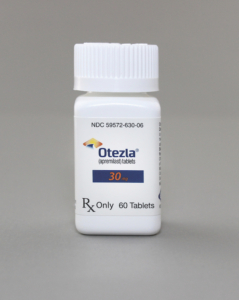
Amgen anticipates that Otezla (apremilast), which generated $2.2 billion in 2021 global sales and nearly $1.05 billion in first-half 2022, will be a strong contributor to the company’s growth over the next several years. Otezla was acquired from Bristol Myers Squibb during November 2019 after the company’s acquisition of Celgene. Otezla is the only oral, non-biologic treatment for psoriasis and psoriatic arthritis.
Amgen is regarded as a leader in inflammation and nephrology. The company’s inflammation portfolio includes Otezla (apremilast), Enbrel (etanercept), Tezspire (tezepelumab-ekko), Amgevita (a biosimilar to AbbVie’s Humira, the world’s top-selling prescription medicine), Riabni (a biosimilar to the Roche/Genentech blockbuster brand Rituxan), and Avsola (a biosimilar to Janssen’s blockbuster product Remicade). The company’s pipeline includes four innovative Phase II inflammation medicines – efavaleukin alfa for systemic lupus erythematosus and ulcerative colitis, ordesekimab for celiac disease, rocatinlimab for atopic dermatitis and rozibafusap alfa for systemic lupus erythematosus – as well as ABP 654, a biosimilar to Janssen’s multibillion-dollar brand Stelara undergoing Phase III development. Amgen’s nephrology portfolio includes the products Epogen (epoetin alfa), Aranesp (darbepoetin alfa), Parsabiv (etelcalcetide) and Sensipar (cinacalcet).
In addition to Tavneos, ChemoCentryx has three early-stage product candidates that target chemoattractant receptors in other inflammatory diseases and an oral checkpoint inhibitor for cancer.
Amgen and Plexium agreed during February 2022 on an exclusive, global, multi-year research collaboration and license agreement to identify novel targeted protein degradation therapeutics toward historically challenging drug targets. The multi-year deal supports the discovery of novel molecular glue therapeutics leveraging insights from Amgen’s expertise in developing multispecific molecules.
The collaboration is initially focused on two programs with Amgen holding options to add additional programs. Plexium is eligible to receive more than $500 million in success-based target access, preclinical, clinical, regulatory, and commercial milestones, as well as tiered single-digit royalty payments, if all options are exercised. Amgen has a commercial license to each program that advances to a predefined preclinical stage of development and is responsible for worldwide development and commercialization.
The partnership is concentrating on expanding targeted protein degradation opportunities through the discovery of previously unrecognized molecular glues or monovalent degraders. These molecules work via a concept of induced proximity that take advantage of the normal biology of a cell to bring two proteins together to drive protein degradation. The collaboration incorporates Plexium’s comprehensive targeted protein degradation platform, powered by a proprietary high-throughput cell-based screening technology that enables the discovery of novel molecular glue therapies.
At the start of 2022, Amgen and Arrakis Therapeutics agreed on a research collaboration concentrated on the discovery and development of RNA degrader therapeutics against a range of difficult-to-drug targets in multiple therapeutic areas. Management said this new class of “targeted RNA degraders” consists of small molecule drugs that selectively destroy RNAs encoding disease-causing proteins by inducing their proximity to nucleases.
Arrakis is leading research activities for the identification of RNA-targeted small-molecule binders against a broad set of Amgen-nominated targets. Both parties are collaboratively designing and functionalizing these molecules to specifically degrade targeted RNAs, and Amgen is leading preclinical and clinical development activities. Amgen was responsible to pay $75 million upfront to Arrakis for five initial programs and has the option to nominate more programs. For every program, Arrakis is eligible for additional payments from Amgen for preclinical, clinical, regulatory, and sales milestones, and royalties up to low double digits. Arrakis could potentially garner several billion dollars in future payments if all milestones are met and future program options are exercised.
In another January deal, Amgen and Generate Biomedicines announced a research collaboration deal to discover and create protein therapeutics for five clinical targets across several therapeutic areas and multiple modalities. Amgen was responsible for paying $50 million in upfront funding for the initial five programs with a potential transaction value of $1.9 billion plus future royalties, and has the option to nominate up to five other programs, at additional cost. For every program, Amgen will pay up to $370 million in future milestones and royalties up to low double digits. Amgen will additionally participate in a future financing round for Generate Biomedicines.
According to Executive VP of R&D David M. Reese, Amgen’s industry-leading human data capabilities include multiple data sources such as real-world clinical data profiles, genomics, transcriptomics and proteomics. Reese said Amgen has built a human data resource consisting of 2.5 million genotypes from around the globe, including more than 350,000 whole genomes, 18,000 transcriptomes and 100,000 proteomes, coupled with phenotypic data for more than 10,000 traits on 2.5 million individuals. This significant data resource is analyzed in real-time via an integrated analytic capability allowing Amgen to rapidly generate insights into disease and human health, Reese noted. The application of these insights is used across the company’s R&D efforts, where 65 percent of Amgen’s non-
oncology portfolio is genetically validated, and human data capabilities inform almost all programs entering clinical development.
Financial & product performance
For Amgen, total revenue during the 2022 second quarter rose 1 percent year-over-year to $6.6 billion, resulting from 3 percent growth in worldwide product sales partially offset by lower Other Revenue from the company’s COVID-19 manufacturing collaboration. Management said volumes increased by double-digits for various products including Repatha (evolocumab), Prolia (denosumab), Lumakras/Lumykras (sotorasib) and Evenity (romosozumab-aqqg).
Amgen’s GAAP EPS grew from 81 cents in second-quarter 2021 to $2.45 during the 2022 second period, driven by a decline in operating expenses due to the write-off of $1.5 billion in Acquired In-Process Research & Development (Acquired IPR&D) associated with the company’s acquisition of Five Prime Therapeutics in Q2 2021 and lower weighted-average shares outstanding in Q2 2022, partially offset by an impairment charge related to the divestiture of the Turkish generics subsidiary Gensenta.
Amgen reported that GAAP operating income increased from $0.8 billion to $2.2 billion for Q2 2022, and GAAP operating margin grew 21.1 percentage points to 34.6 percent.
Amgen generated $1.7 billion of free cash flow in second-quarter 2022 compared to the one-year earlier period amount of $1.7 billion.
The company’s total product sales grew 3 percent compared to the second quarter of 2021. Q2 2022 unit volumes increased 10 percent, partially offset by 6 percent lower net selling price and 2 percent negative impact from foreign exchange.
Total product sales rose during first-half 2022, primarily driven by higher unit demand for certain brands, including Repatha, Prolia, Evenity, Lumakras/Lumykras and Kyprolis (carfilzomib), and by favorable changes to estimated sales deductions, partially offset by decreases in the net selling prices of certain products and unfavorable changes in foreign currency exchange rates. Company management said for the remainder of 2022, net selling prices were expected to continue to decrease at a portfolio level, driven by increased competition.
Other revenue grew for the six-month period ended June 30, 2022, primarily driven by higher revenue from COVID-19 antibody material.
Enbrel represented Amgen’s top-selling product performer in the first half of 2022, with global sales coming in at $1.91 billion, falling 7 percent year-over-year. Amgen says the decrease in Enbrel sales for the three and six months ended June 30, 2022, was primarily driven by lower net selling price and lower unit demand.
An increase in Prolia sales for Q2 and first-half 2022 was primarily driven by higher unit demand. Sales during the January-June 2022 period rose 13 percent to $1.77 billion.
Amgen’s No. 3 seller during the 2022 first half was Otezla at $1.05 billion, rising 3 percent versus the 2021 first-half period. According to the company, worldwide sales growth was primarily driven by higher unit demand and favorable changes to estimated sales deductions, partially offset by lower net selling price and unfavorable changes to inventory. Amgen said global Otezla sales are expected to grow by low double-digits annually, on average, before the drug’s U.S. loss of exclusivity.
Xgeva (denosumab) global sales for the first six months of 2022 increased 8 percent versus the one-year earlier period, coming in at $1.04 billion. Worldwide sales growth sales for the three and six months ended June 30, 2022, was mainly driven by higher net selling price and favorable changes to estimated sales deductions.
A 1 percent decrease in Aranesp sales for first-half 2022 was driven by lower net selling price and unfavorable changes in foreign currency exchange rates, partially offset by favorable changes to estimated sales deductions and higher unit demand. Aranesp sales totaled $715 million during the first six months of 2022. According to Amgen, the product continues to face competition from a long-acting erythropoiesis-stimulating agent and from biosimilar versions of Epogen, which will continue to impact sales.
Global sales for Neulasta (pegfilgrastim) during the first six-month period of 2022 fell 32 percent year-over-year to $658 million, mainly driven by lower net selling price and unit demand. Amgen says increased competition as a result of biosimilar versions of Neulasta has had and will continue to have a significant adverse impact on brand sales, including accelerating net price erosion and lower unit demand. The company expects other biosimilar versions, including biosimilars that will use an on-body injector that would compete with Amgen’s Onpro injector, to be approved in the future.
Repatha sales growth of 14 percent during the first half of 2022 was fueled by higher unit demand, partially offset by lower net selling price, resulting in sales of $654 million. Contracting changes to support and expand Medicare Part D and commercial patient access and the inclusion of Repatha on China’s National Reimbursement Drug List as of January 1, 2022, led to the decline to net selling price in 2022. Management projects that Repatha will grow into a multi-billion-dollar franchise through 2030.
Increased Kyprolis sales globally during the first half of 2022 were driven by higher unit demand, partially offset by lower net selling price. The medicine’s sales rose 14 percent year-over-year to $604 million. The FDA has granted tentative or final approval of ANDAs for generic carfilzomib products filed by various companies. The date of approval of those ANDAs for generic carfilzomib products is governed by the Hatch–Waxman Act and any applicable settlement deals between Amgen and certain companies that seek to develop generic carfilzomib products, Amgen said.
Growth in global Nplate (romiplostim) sales for the three and six months ended June 30, 2022, was mainly driven by higher unit demand and net selling price. Amgen reported that first-half sales improved 17 percent to $550 million.
According to management in announcing the company’s Q2 results, Amgen’s 2022 total revenue guidance was revised to $25.5-$26.4 billion and EPS guidance was revised to $11.01-$12.15 on a GAAP basis.
Product approvals & pipeline updates
Amgen invested $4.8 billion in R&D during 2021, up 15 percent from the previous year, advancing numerous potential new medicines at all stages in the company’s pipeline and securing three significant regulatory approvals. One of those approvals was Lumakras/Lumykras, the first medicine approved for treating KRAS G12C-mutated non-small cell lung cancer (NSCLC), the culmination of a 40-year quest to treat cancers with this particular mutation. Initially approved by the FDA in May 2021, Lumakras has been approved in more than 40 countries. The company continues to study Lumakras as a monotherapy and in combination- therapy regimens for NSCLC and other solid tumors, including colorectal and pancreatic cancer.

Launched in the United States during January 2022, Tezspire is the first biologic for severe asthma that does not have a phenotype – eosinophilic or allergic – or biomarker limitation within the drug’s approved label. Tezspire acts at the top of the inflammatory cascade by targeting thymic stromal lymphopoietin (TSLP), an epithelial cytokine.
Tezspire won U.S. marketing clearance in December 2021 as the first biologic for severe asthma that does not have a phenotype or biomarker limitation within its approved label. According to management, this provides Amgen with the opportunity to reach a broad population of patients who are living with this serious disease and are potential candidates for a biologic therapy such as Tezspire. Launched in the United States during January 2022, Amgen is evaluating the product in several other indications, including chronic rhinosinusitis with nasal polyps and chronic obstructive pulmonary disease.
Also during December, Otezla was cleared for an expanded indication by the FDA, making the medicine the first oral therapy approved to treat plaque psoriasis across all levels of severity and enabling Amgen to reach an another 1.5 million patients. Company management anticipates that Otezla – which generated $2.2 billion in 2021 worldwide sales – to be a strong contributor to Amgen’s growth during the next several years.
Amgen spent about $2 billion on R&D during first-half 2022.
The company is advancing the largest and broadest worldwide KRAS G12C inhibitor development program through Lumakras/Lumykras with unparalleled speed and exploring more than 10 sotorasib combo regimens, with study sites spanning five continents. More than 6,500 patients have received Lumakras/Lumykras via the development program and commercial use. The European Commission granted conditional marketing authorization for Lumykras in January 2022 as the first targeted therapy for patients with the KRAS G12C mutation. Also in January, Lumakras was approved in Japan for treating KRAS G12C-mutated positive, unresectable, advanced and/or recurrent NSCLC that has progressed after systemic anticancer therapy.
The company reported detailed results from the worldwide Phase III CodeBreaK 200 study in September 2022, which demonstrated once-daily oral Lumakras/Lumykras led to significantly superior progression-
free survival (PFS; primary endpoint) and a significantly higher objective response rate (ORR; a key secondary endpoint) in patients with KRAS G12C-mutated NSCLC, compared with the intravenous chemo docetaxel. Of note, patient-reported outcomes (PROs; a key secondary endpoint) were improved with Lumakras compared to docetaxel. “This is the first Phase III randomized clinical trial for a KRASG12C inhibitor to show benefit in heavily pre-treated patients who have limited treatment options,” stated Melissa L. Johnson, M.D., director of Lung Cancer Research, Sarah Cannon Research Institute at Tennessee Oncology and presenting author.
Clinical data were presented at the American Society of Clinical Oncology (ASCO) annual meeting in June 2022 where investigators assessed patterns of resistance to Lumakras in patients with NSCLC) and colorectal cancer (CRC) at disease progression. These and other data continue to guide the Lumakras clinical development program, per Amgen.
Company management is planning to launch a Phase III trial of Lumakras plus chemotherapy in first-line KRAS G12C mutant and PD-L1 negative advanced/metastatic NSCLC.
A Phase III trial of Lumakras in combination with Amgen’s monoclonal anti-epidermal growth factor receptor (anti-EGFR) antibody Vectibix (panitumumab) in third-line KRAS G12C-mutated CRC continued to enroll as of August 2022. Vectibix represents the first fully human monoclonal anti-EGFR antibody approved by the FDA for treating metastatic colorectal cancer (mCRC), initially approved by U.S. regulators in September 2006.
Tezspire was recommended for approval during July 2022 in the European Union by the Committee for Medicinal Products for Human Use for severe asthma. Tezspire is being developed in collaboration with AstraZeneca.
The PASSAGE Phase IV real-
world effectiveness study and the WAYFINDER Phase IIIb trial were enrolling patients with severe asthma as of August.
The SUNRISE Phase III trial, designed to assess the efficacy and safety of Tezspire in reducing oral corticosteroid use in adults with oral corticosteroid dependent asthma, started during 2022.
As of August, a Phase III trial continued to enroll patients with chronic rhinosinusitis with nasal polyps. Additionally, planning was under way for a Phase III trial for eosinophilic esophagitis.
A Phase IIb study in patients with chronic spontaneous urticaria is fully enrolled, and data readout is anticipated during first-half 2023. A Phase II trial was enrolling patients with chronic obstructive pulmonary disease as of August 2022.
The primary and secondary endpoints of the SPROUT trial, an international Phase III, multi-center, randomized, double-blind, placebo-controlled study testing Otezla in pediatric patients (ages 6 through 17) with moderate-to-severe pediatric plaque psoriasis, were successfully met. Amgen said no new safety signals were identified and the overall treatment-
emergent adverse event profile during the placebo-controlled phase of the clinical trial was consistent with the known safety profile of Otezla. The study will continue to completion and final analysis is anticipated during 2023.
In September 2022, 16-week data from the DISCREET study in adults with moderate-to-severe genital psoriasis showed a clinically meaningful and statistically significant improvement in genital psoriasis, with twice as many patients achieving the primary endpoint of a clear (0) or almost clear (1) score on the Physician Global Assessment of Genitalia (sPGA-G) scale when receiving Otezla, when compared with placebo (38.7 percent for Otezla versus 19.1 percent for placebo; P = 0.0003). The secondary endpoints of the clinical trial were additionally met.
Since initially receiving FDA approval in 2014, Otezla has been prescribed to more than 700,000 patients. The product is an oral small-molecule inhibitor of phosphodiesterase 4 (PDE4) specific for cyclic adenosine monophosphate (cAMP). PDE4 inhibition leads to increased intracellular cAMP levels, which is believed to indirectly modulate the production of inflammatory mediators. The specific mechanism(s) by which Otezla exerts the drug’s therapeutic action in patients is not well defined.
As for another Amgen blockbuster medicine, the company during August 2022 presented new compelling data from the Phase III FOURIER open label extension trials of Repatha in adults with atherosclerotic cardiovascular disease (ASCVD). Repatha is the first and only proprotein convertase subtilisin/kexin type 9 inhibitor that has demonstrated long-term clinical outcomes in patients with ASCVD for up to 8.4 years.
According to Amgen, earlier treatment with Repatha resulted in a lower incidence of major cardiovascular events, including CV death. Amgen reported that 80 percent of patients achieved guideline directed LDL-C levels of <55 mg/dL at week 12.
Repatha is cleared for marketing in more than 75 countries, including the United States, Japan, Canada, and in all 28 EU member countries.
The ROCKET Phase III program assessing the anti-OX40 monoclonal antibody rocatinlimab (formerly AMG 451/KHK4083), in patients with moderate-to-severe atopic dermatitis started in June 2022. Following additional discussions with regulators and Amgen’s collaboration partner Kyowa Kirin, the company is amending the clinical trials to further improve patient convenience and investigate a range of doses. No safety or efficacy issues have arisen, according to Amgen.
In June, Amgen and its partner Takeda Pharmaceutical presented data from the Phase III PARADIGM clinical study of Vectibix in Japanese patients with previously untreated unresectable wild-type RAS metastatic CRC at the 2022 ASCO annual meeting. These data showed that the mFOLFOX6 + Vectibix combo provides a statistically significant improvement in overall survival over the mFOLFOX6 + bevacizumab combination in patients with a left-sided primary tumor or regardless of tumor locations.
Amgen is testing bemarituzumab, a first-in-class monoclonal antibody targeting fibroblast growth factor receptor 2b (FGFR2b), in various stages of development. The final analysis of the FIGHT study, a Phase II randomized, double-blind, controlled trial assessing bemarituzumab and modified FOLFOX6 in patients with previously untreated advanced gastric and gastroesophageal junction cancer, was completed in 2022. Amgen says these results show that bemarituzumab + mFOLFOX6 improves the clinical outcome of patients with FGFR2b expressing tumors with no new safety concerns. A greater survival benefit was observed with increasing FGFR2b expression levels.
Amgen is performing two Phase III trials with this molecule in gastric cancer and will evaluate the potential of bemarituzumab in other cancers that express FGFR2b, including squamous NSCLC and various other solid tumors.
A Phase III trial (FORTITUDE-101) of bemarituzumab in combination with chemo, versus placebo plus chemotherapy in first-line gastric cancer with FGFR2b overexpression continued to enroll patients during Q2 2022. A Phase Ib/III trial (FORTITUDE-102) of bemarituzumab with chemotherapy and nivolumab versus chemo and nivolumab in first-line gastric cancer with FGFR2b overexpression was enrolling patients in the Phase III portion of the study in the second quarter.
The FDA during June 2022 approved the biosimilar Riabni (rituximab-arrx) in combination with methotrexate for adults with moderate-to-severely active rheumatoid arthritis who have had an inadequate response to one or more tumor necrosis factor antagonist therapies. Riabni was previously approved for treating adults with non-Hodgkin’s lymphoma, chronic lymphocytic leukemia, granulomatosis with polyangiitis (also called Wegener’s granulomatosis), and microscopic polyangiitis. Riabni is a CD20-directed cytolytic antibody.
Also on the biosimilars front, the final analysis from a Phase III trial assessing the efficacy and safety of ABP 654 versus Stelara (ustekinumab) in adults with moderate-to-severe plaque psoriasis is anticipated in 2022.
A U.S. Phase III trial testing an interchangeability designation for ABP 654 is under way.
Positive top-line results were reported in August 2022 for ABP 959, an investigational biosimilar to Alexion’s Soliris (eculizumab). DAHLIA is a randomized, double-blind, active-controlled, two-period crossover Phase III trial assessing the efficacy and safety of ABP 959 versus Soliris in adults with paroxysmal nocturnal hemoglobinuria. The clinical trial met its primary endpoints, showing no clinically meaningful differences between ABP 959 and Soliris based on the control of intravascular hemolysis as measured by lactate dehydrogenase.
Phase III studies of ABP 938, an investigational biosimilar to Regeneron’s multibillion-dollar medicine Eylea (aflibercept), are on track per Amgen, with data expected during 2022.
Other late-stage development includes a Phase III trial to support an interchangeability designation in the United States for Amjevita (adalimumab-atto). The U.S. label for Amjevita has been modified to include pediatric Crohn’s disease (ages 6 and older) and juvenile idiopathic arthritis (ages 2-3). Amgen anticipates the U.S. launch of Amjevita on January 31, 2023.
Company management expects Amgen’s biosimilars revenue to more than double from 2021 to 2030.




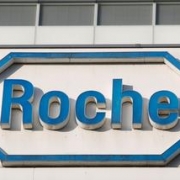

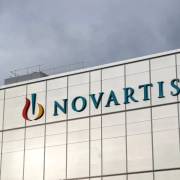 Reuters Health
Reuters Health
